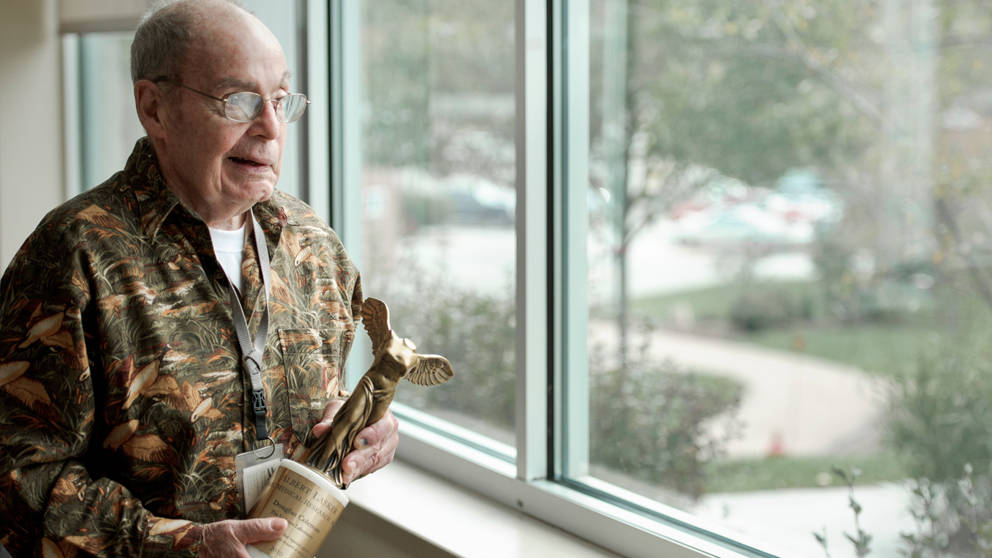
Bar Harbor, Maine - Retired Jackson Laboratory scientist, environmentalist and philanthropist Douglas Coleman, Ph.D., whose elegantly simple approach to addressing complex biological problems earned him scientific renown and many international prizes, died at his home in Lamoine, Maine, on April 16, 2014.
Coleman’s work established the first clues to a genetic component in obesity. In the 1970s, he conducted a series of experiments that led him to propose the existence of a "satiety factor" that would account for obesity and type 2 diabetes among certain laboratory mice.
Jackson Laboratory President and CEO Edison Liu, M.D., said, "I've heard Doug Coleman say on several occasions that in all things scientific as well as environmental, he tried to leave things better than he found them. I would add a third category: He left an indelible and profoundly beneficial mark on The Jackson Laboratory community. Doug was a unique combination of brilliant, honest, funny and modest, and he was unbeatable company. He leaves an inspiring legacy at the Lab and a giant void in our hearts."
Building on Coleman’s landmark experiments, Jeffrey Friedman, M.D., Ph.D., of Rockefeller University and the Howard Hughes Medical Institute, would later identify that factor as leptin, a hormone that regulates food intake and body weight.
“Doug was a scientist's scientist and a good friend,” said Jeffrey M. Friedman, M.D., Ph.D., Marilyn M. Simpson Professor and head of the Laboratory of Molecular Genetics at The Rockefeller University. “His research in the 1970s combined genetics and physiology in a creative and illuminating way and led him to hypothesize that body weight was controlled by a hormonal system. This prescient hypothesis animated the research in my laboratory and was later proved correct with the cloning of the ob gene and the identification of leptin.”
Coleman was born on Oct. 6, 1931, in Stratford, Ontario, Canada. After attending elementary and secondary schools in Stratford, he went on to McMaster University, Hamilton, Ontario, and received his BSc. in chemistry in 1954. It was there that he met his future wife, Beverly Benallick. He received his M.S. and Ph.D. from the University of Wisconsin, Madison, in 1956 and 1958, respectively.
He came to the then-Roscoe B. Jackson Memorial Laboratory in 1958 as an associate staff scientist, working with George Snell, who would go on to win the 1980 Nobel Prize. “My intention was to stay one or two years, learning some biology and genetics,” Coleman recounted in a 2012 interview. “Instead, I spent my entire career at the Laboratory.” He rose through the ranks to staff scientist in 1961, and senior staff scientist in 1968. He served as assistant director of research, 1968-70, and interim director, 1975-76. He retired from his scientific career in 1991.
Coleman frequently quoted Louis Pasteur, who said, "Luck favors the prepared mind," adding, "My mind was prepared by many mentors at The Jackson Laboratory."
In 1977, Coleman received the first of many international awards for his seminal studies: the Claude Bernard Medal by the European Diabetes Federation. He was elected to the National Academy of Sciences in 1998, and won the 1999 McMaster University Distinguished Alumni Award and the 2005 Gairdner Foundation International Award. He and Friedman shared the 2009 Shaw Prize, the 2010 Albert Lasker Basic Medical Research Award, and in 2013 the Frontiers of Knowledge Award in Biomedicine from the BBVA Foundation, based in Bilbao, Spain, and the King Faisal International Prize in Medicine from the Saudi Arabian King Faisal Foundation.
Coleman plunged into retirement with the same enthusiasm that he had displayed with family and research. His love of the outdoors and concern for the environment led him to become actively interested in forest management, land protection, conservation, and other ecological issues. He spent long hours each day rehabilitating his own woodlot, making recreational trails that the public, especially students, were encouraged to use for both recreational and educational purposes.
He helped his wife establish a wildlife garden in which many of the native plants were displayed for those not able or interested in walking the property. He was involved with the Small Woodlot Owners Association and was the area representative. He was a director and president of the Frenchman Bay Conservancy, and a longtime member of the Lamoine Planning Board.
Coleman established two $100,000 endowments at The Jackson Laboratory to support research and education. The Douglas Coleman Research Fund supports Laboratory investigators, with preference given to early-career scientists who are studying obesity and diabetes. The Beverly Coleman Memorial Fund supports young students and educational programs.
In recognition of his commitment to forests and conservation, he and Beverly received the 1998 Forest Steward Award by the State of Maine. As well as hiking and sailing, the couple traveled extensively, and were particularly interested in Native American cultures and their problems, extending from populations in the Arctic to South America. After Beverly died in 2009, he continued his travels and outdoor activities until about a year ago, when vision problems and other medical issues kept him close to home.
Coleman’s survivors include his son Tom, daughter-in-law, Sarah Fashena, and grandson, Benjamin; and son David and David’s partner, Kelly Jack.
The Jackson Laboratory is an independent, nonprofit biomedical research institution and National Cancer Institute-designated Cancer Center based in Bar Harbor, Maine, with a facility in Sacramento, Calif., and a new genomic medicine institute in Farmington, Conn. It employs a total staff of more than 1,600.